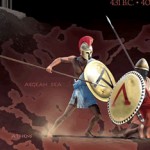It’s All Greek to Me
 One of my postings last year, <“The Summer of 69″>, reflected on the incredible capacity we have to accomplish, particularly when we face tough challenges rather than each other. There is incalculable capability available when people endeavor to put the objective in front of them and view it from the same side of the table. By now, most of us have benefited from the negotiating strategy of focusing on issues versus positions and to be tough on issues, but softer on people. I’ve never been more disappointed or sadder than today, as I observe the reprehensible behavior of elected officials in facing the monumental challenges of our economy, health and welfare, the common good. We may not have complete control over the forces, dark ones at times, at play at the political playground, but we have almost infinite control over how we can face our own organizational challenges, challenges that may require fundamental changes in practices, behaviors, entitlements, and expectations. Today and yesterday are already gone, irretrievable forever, and a very poor place to try to live in, for they cannot create value.
One of my postings last year, <“The Summer of 69″>, reflected on the incredible capacity we have to accomplish, particularly when we face tough challenges rather than each other. There is incalculable capability available when people endeavor to put the objective in front of them and view it from the same side of the table. By now, most of us have benefited from the negotiating strategy of focusing on issues versus positions and to be tough on issues, but softer on people. I’ve never been more disappointed or sadder than today, as I observe the reprehensible behavior of elected officials in facing the monumental challenges of our economy, health and welfare, the common good. We may not have complete control over the forces, dark ones at times, at play at the political playground, but we have almost infinite control over how we can face our own organizational challenges, challenges that may require fundamental changes in practices, behaviors, entitlements, and expectations. Today and yesterday are already gone, irretrievable forever, and a very poor place to try to live in, for they cannot create value.
There are few histories that can better illustrate the potential that we, as a society or organization, have to turn opportunity into destructive conflict, than looking to the Hellenic (Greek) city-states 2500 years ago. By now there have been countless stories, tales, legends, books, movies and plays that retell:
- The Greco-Persian Wars (the Persian Wars), two sets of conflicts between the Persian Empire and the Hellenic city-states from 499 BC until 449 BC. Athenians and Spartans facing the Persians with a bias to what they had in common.
- The Peloponnesian War, a series of conflicts between the Athenian Empire and the Peloponnesian League (led by Sparta) from 431 to 404 B.C. Athenians and Spartans facing each other with a bias to what made them different.
In the first series of wars, the Greek city-states, fierce competitors face a challenge that threatened to reshape life as they knew it, if conquered and integrated into the Persian Empire. In fact, much of what we consider western society, shaped by Greco-Roman thought, may have never existed at all. The wars are a rich area for study, insight and sheer dramatic entertainment. They demonstrate just how much competitors can find common ground, focus on interests, and come together to solve what appeared to be unsolvable challenges. Sadly, once success was reached, the darker side of their self interests, rather than the greater good, returned with a vengeance in less than 20 years, the Peloponnesian Wars.
During the Peloponnesian War, the competing parties nearly destroyed each other. Athens was so devastated that it never recovered. The levels of horror and barbarism each party perpetuated upon each other redefined how the city states would resolve differences in the future. Poverty and societal changes led to a poorer, more devastating and dark future. What had been competing parties unleashed levels of unproductive incivility, a harbinger of civil wars then and, subsequently, in the modern world.
The challenges we face will not perpetuate civil wars. Yet, big challenges can perpetuate incivility. When there is a lot a stake and change is on the table, win-lose can create polarization perpetuating sinister and unprincipled misrepresentation that demonizes opponents. It is that demonization that unraveled parts of ancient Greek society into a shredded tapestry, still threadbare today.
Among my favorite quotes (author unknown) is “When faced with two choices, always take the third one.” Walking away with our marbles, as a once noble patrician is urging others to do, can create Peloponnesian Polarity.
There is a tide in the affairs of men which, taken at the flood, leads on to fortune; Omitted, all the voyage of their life is bound in shallows and in miseries. On such a full sea are we now afloat, and we must take the current when it serves, or lose our ventures. William Shakespeare, Julius Caesar Act 4
Thoughts?

